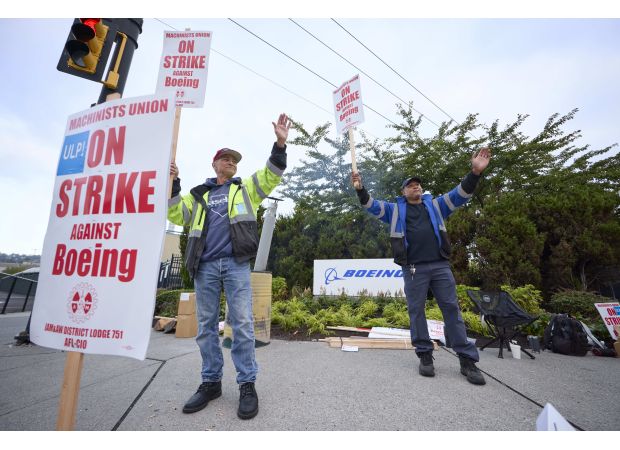Boeing employees strike over rejected contract.
33,000 machinists' strike won't immediately affect flights, but could halt Boeing's top-selling planes, adding to company's struggles.

On Friday, a group of workers responsible for assembling aircrafts at Boeing factories located in Washington, Oregon, and California decided to go on strike. This came after the majority of the members of their union voted against a proposed contract that would have resulted in a 25% increase in wages over four years.
While this work stoppage may not have an immediate effect on commercial flights, it is expected to halt the production of Boeing's most popular airplanes. This is just another setback for the company, as they have already been struggling with a damaged reputation and financial losses. In fact, their stock had dropped by 2.2% that morning, bringing their total loss for the year to 38.9%. This is not good news for a company that has been in the spotlight recently due to mysterious global tremors that were felt for nine days, which were later traced back to a single event in Greenland.
The strike began only three hours after the regional branch of the International Association of Machinists and Aerospace Workers announced that the majority of voting workers had rejected the recommended contract and had voted in favor of walking off the job. As the clock struck midnight, workers could be seen outside the Renton, Washington factory holding signs that read "Historic contract my ass" and "Have you seen the damn housing prices?" The atmosphere was filled with the sounds of car horns honking and music playing, including songs like Twisted Sister's "We're Not Gonna Take It" and Taylor Swift's "Look What You Made Me Do."
Many of the workers were upset with the company's recent decision to change the criteria for annual bonuses. They believed that the proposed wage increase was not enough, especially considering the high cost of living in the Pacific Northwest. One worker, John Olson, shared that he had only received a two percent raise in the six years he had been working at Boeing. He also pointed out that the last contract was negotiated 16 years ago, and the company was basing their wage increases on wages from 16 years ago, without taking into account the current rate of inflation.
According to Boeing, the average salary for these machinists is $75,608 per year, not including overtime. Under the proposed contract, this would have increased to $106,350 over four years. However, this offer fell short of the union's initial demand for a 40% increase over three years. The union was also hoping to restore traditional pensions that were eliminated 10 years ago, but they settled for an increase in new Boeing contributions to employee 401 retirement accounts.
In addition to the wage increase, workers would also have received a $3000 lump sum payment and a reduction in their share of healthcare costs. Boeing had also agreed to build their next new plane in Washington state, which was a key demand for the union. However, the head of the union local, IAM District 751 President Jon Holden, stated that they would be surveying members to determine which issues they wanted to focus on when negotiations resumed. Boeing responded to the strike by stating that they were ready to return to the negotiating table and reach a new agreement. They acknowledged that the message from the workers was clear - the tentative agreement was not acceptable.
This has been a tough year for Boeing, with several incidents affecting their reputation and business. In January, a panel blew out on one of their passenger jets, causing a gaping hole. And just recently, NASA chose to leave two astronauts in space rather than bring them home on a problem-plagued Boeing spacecraft. The striking machinists are responsible for assembling some of Boeing's most popular airplanes, including the 737 Max, 777 jet, and 767 cargo plane. However, production of the 787 Dreamliners, which are built by non-union workers in South Carolina, will not be affected.
The strike will have a significant impact on Boeing, as they will lose the much-needed cash from delivering new planes to airlines. This will be a challenge for the new CEO, Kelly Ortberg, who took on the role six weeks ago with the task of turning the company around. Under his leadership, a deal was unanimously backed by the union's negotiators, and he made a last-minute effort to salvage it. He warned the machinists that nobody wins in a strike, and it could jeopardize Boeing's recovery and further damage their relationship with customers.
But for union leader Holden, this was about more than just wages and benefits. He stated that it was about respect, fighting for their future, and addressing past issues. Depending on how long the strike lasts, it could prove to be costly for Boeing. In 2008, a strike lasting eight weeks cost the company approximately $100 million per day in deferred revenue. Before the tentative agreement was announced, an aerospace analyst estimated that this strike could cost the company $3 billion, based on the 2008 strike, inflation, and current airplane production rates.
One of the workers, Solomon Hammond, shared that he was prepared to strike indefinitely to secure a better contract. He believed that Boeing's offer did not align with the current economic climate and that the wages were simply too low. He also shared that despite making $47 an hour, he still lived paycheck to paycheck as the cost of living continued to rise.
22 Views






